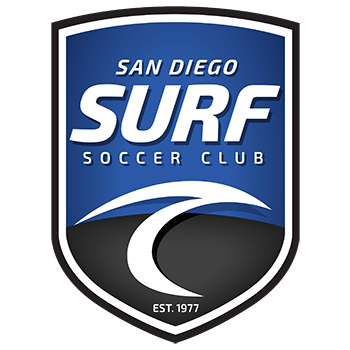The Inside Scoop: Surf SC’s Girls Director of Coaching Mark Spooner
One of the oldest competitive youth soccer club in San Diego, San Diego Surf Soccer Club was established in 1977 to draw the best players from the surrounding areas of Carlsbad, Encinitas, Rancho Santa Fe, Solana Beach and Del Mar to form teams to compete against the best teams in Southern California and across the nation. Today, the club has developed homegrown players who have reached the pinnacle of soccer.
Youth Soccer News: San Diego Surf SC is one of the most respected youth soccer clubs in the country with many national team and collegiate players suiting up for the club during their early years.
Home to ECNL and the U.S. Soccer Development Academy squads on the girls side, Surf SC has developed a pathway for promising players to take their talents to the next level.
Often the next level is college and 100% of the graduating ECNL ’98 team has been offered collegiate roster spots.
SoccerToday’s Diane Scavuzzo spoke with Surf SC Girls Director of Coaching Mark Spooner on his role with the club and his coaching philosophy.
Diane Scavuzzo: What is the role of a coach?
Mark Spooner: I think the role of the coach in youth sports is rather complex.
There are so many facets to the role of the coach in youth soccer. Outside of the obvious answer on coaching techniques, tactics, positional development — I think a youth coach can also act as mentor, a guidance counselor, a demonstrator and more! We are entrusted by parents to not only develop their kids to be the best they can be on the soccer field but also off it it as well.
As a youth coach, we are responsible for teaching skills that will give kids the best chance of succeeding in life whatever their personal goals are and teaching life skills.
Ultimately, I think that a coach should be able to create the right, safe environment for learning to take place.
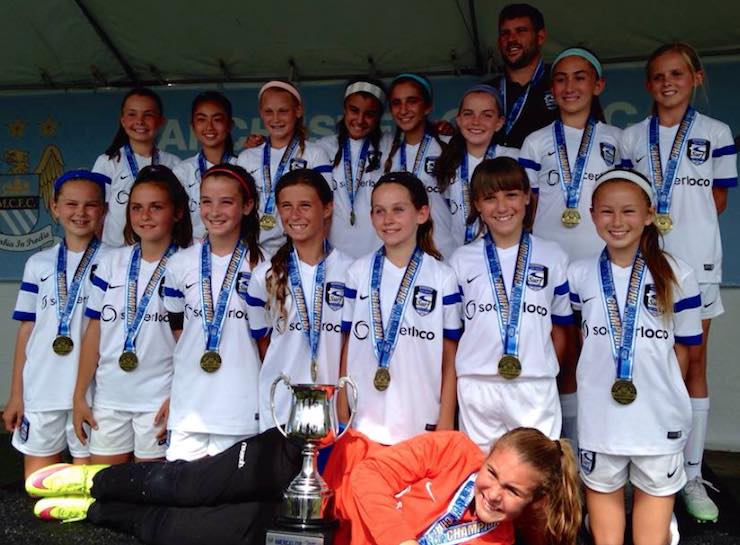
Diane Scavuzzo: What are your goals for developing youth soccer players at Surf SC?
Mark Spooner: My goal is pretty simple really — to help each player fulfill their potential and meet the goals they have set for themselves.
Sometimes we need to help the player set realistic goals, or encourage them to have a higher goal, but ultimately our job is to help the player achieve their goal.
Getting a little deeper, we have many short term goals that really lead to the main goal of developing players that are competent in the four corner model — technical, tactical, physical and psychological.
Our curriculum and all our sessions are based around creating players that are …
technically excellent, are able to make good decisions in the flow of play, are passionate, disciplined, creative and can problem solve.
Diane Scavuzzo: You joined Surf SC in September of 2013 — since then, what has been your biggest challenge and your greatest accomplishment?
Mark Spooner: I am huge believer in every challenge we face is just an opportunity to overcome something and be great.
Was far as greatest accomplishment, it is hard to choose from a National Championship win, Far West Regional win or State Cup wins.
I take so much pride in seeing the kids succeed.
The texts or phone calls I get from a player or parent when they get their college commitment or achieve something that is important to them is extremely humbling. I almost cried when I went to the San Diego Hall of Champions commitment day seeing all of our players walk on stage and sign their National Letters of Intents.
Diane Scavuzzo: How would you describe the culture of the club?
Mark Spooner: Unbelievable! Where we are right now is a testament to the people at this club. We have a staff that are hardworking, knowledgeable, driven, humble and above all else are just good people.
We work tireless hours and all share the same drive of excellence. Daily as a staff we are challenging each other to become better than we were yesterday.
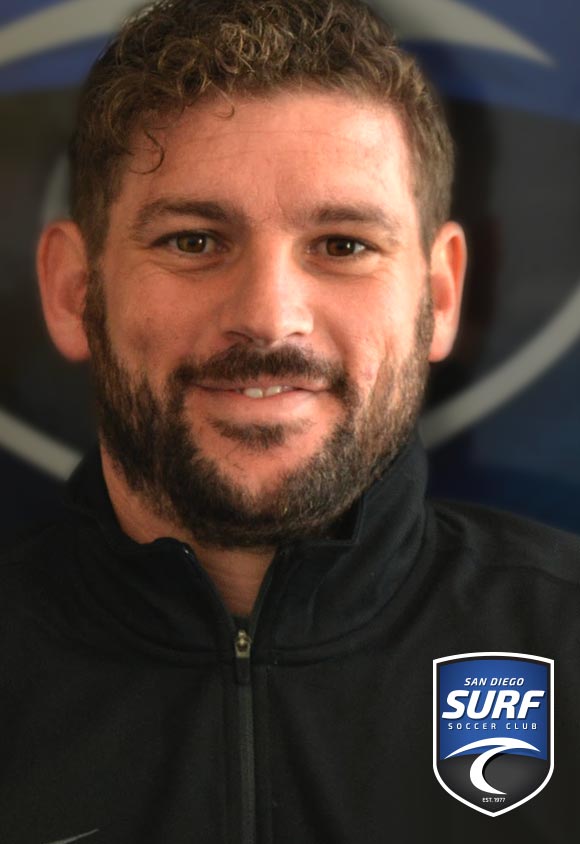
Diane Scavuzzo: What do parents need to understand about player development?
Mark Spooner: That it’s a process. There are so many facets to a player’s development that it takes time. We are going to put players into situations that are uncomfortable and pushes them. Some players react different to that process and take longer to adjust. Player development needs be individualized as well as in the team environment, which is why we created our Individual Player Development Program.
There will be times where we need to ramp up a player’s development, but there will also be times that we need to slow it down or create a new challenge. Ultimately, what we ask parents to understand is that it is a process and there will be speed bumps, but that is okay!
Diane Scavuzzo: How different is youth soccer in the USA compared to England where you grew up?
Mark Spooner: In the grand scheme of things, it’s not that different at all. Across the globe their are millions of youth soccer coaches that are all driving the next generation to become the best they can be. The end-goal can be different from nation to nation but overall it’s the same goal.
When I was England our goal at the club was to find and develop players that we would be able to push into the first team.
99.9% of clubs in America don’t have a professional team that they can push to, but it doesn’t stop them trying to find and develop players they can push to the collegiate level, which we don’t really have in the UK — or to the pro level.
In America, there are many more options in youth sports. In the UK, we are a football driven country and lives revolve around it, be it watching it on TV, going to live games, talking about it at the dinner table or debating football topics with friends.
Diane Scavuzzo: What does it take to be a great impact player?
Mark Spooner: As part of the Surf SC Curriculum, we have a group of skill sets which we believe create the complete player in any given position. Each position has a little different set of skills that vary depending upon where you play. If you look to the top players in the world they all share some traits such as being self driven, have a huge dislike of losing, self confidence, etc.
I think we are helping young girls have big dreams — at the very least, now we are aware of what needs to be done.
Today, a female soccer player can dream of that coveted college scholarship, playing pro or even forging a career in the game as a coach. We are seeing top female players such as Alex Morgan and Carli Lloyd go abroad and broaden their horizons. The opportunities are there and will only continue to grow.
Diane Scavuzzo: What is the role of the U.S. Soccer Development Academy?
Mark Spooner: I think the ultimate role is to bridge the gap in development across the country.
The U.S. is large and diverse and the game can vary from state to state.
I think the success of the U.S. Women’s National Team in the future relies on the clubs that are developing players, but there needs to be a unified form of player development for that to happen. I think a platform that allows that happen is pivotal to the success that is desired.
Diane Scavuzzo: What inspires you?
Mark Spooner: A lot of things. For a long time I was driven by a fear of failure, but as I’ve got older and have learned to accept failure is a part of life.
Nowadays, I am inspired by the people I meet, the players I coach and the coaches I work with.
As a staff, right now we spend countless hours with others watching games, writing sessions and quizzing each other on the game in general. We drive and inspire each other to be better at what we do and that can only be a good thing.
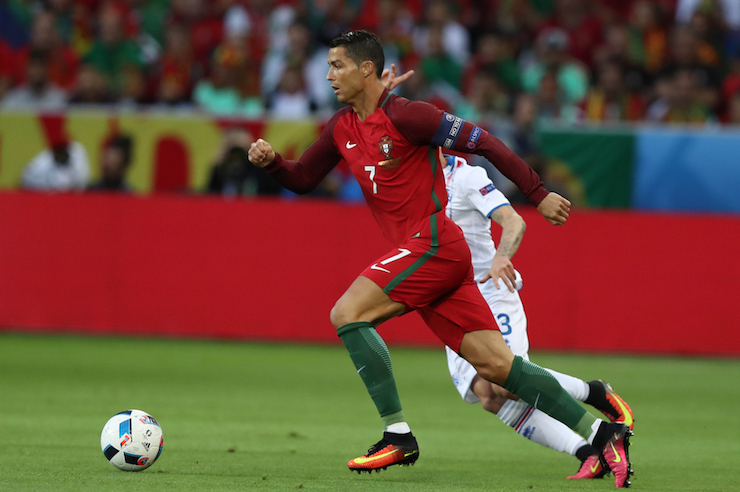
Diane Scavuzzo: Who is the greatest pro player today?
Mark Spooner: There are quite a few nowadays to choose from and for different reasons. Going beyond the obvious flamboyance of Messi and Ronaldo, I have different players I admire for different reasons. Players such a Thomas Muller and Xavi are players that are effective sometimes without being flamboyant, players such as N’Golo Kante and Sergio Busquets are midfield engines that drive their respective teams around them without the glory. Matts Hummels and Georgia Chiellini are masters of defending.
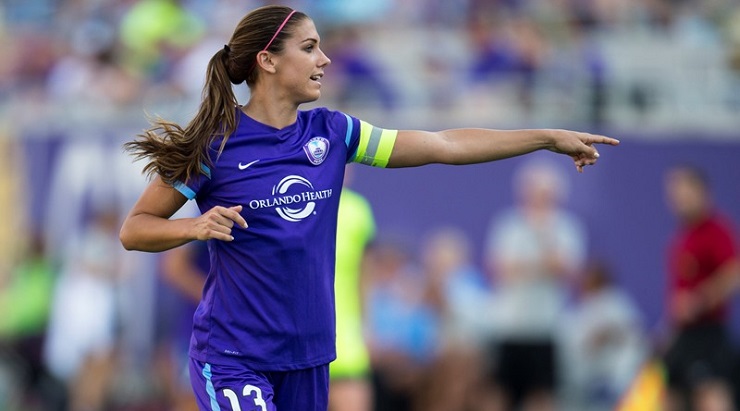
All these players are the amongst the best at what they do and great teams cannot form without them.
In regards to the best female players, I think I can’t help but admire Alex Morgan. Mallory Pugh is also a very exciting prospect coming through and it will be great to watch her development as she progresses over the years.
As a team, I think several stick out, Seattle Reign and Portland Thorns are doing great jobs of driving exposure and fan base for the women’s game. Man City, Chelsea and Lyon are putting great financial backing into the women’s game, which will only help grow it.
Diane Scavuzzo: If you could pick any super power, what would it be and why?
Mark Spooner: I’m not sure it’s a super power, but I wish I was capable of Omnilingualism. I’m fascinated by other cultures and love to travel but only speak English! I’ve been telling myself to learn a new language since I was about 14 and so far I’ve only learned to speak very, very limited German.
Let me go more for a more standard answer — I wish I could fly. I can’t stand sitting in traffic or waiting around so that would help me! I’m too impatient!


